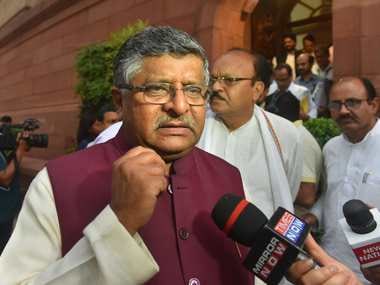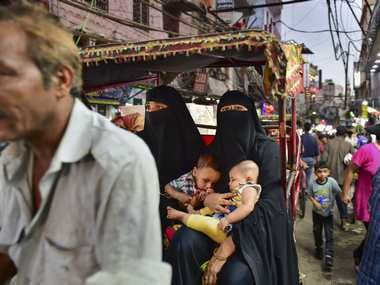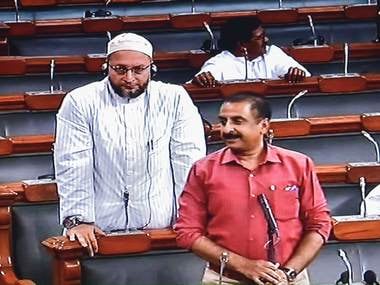The public’s expectation from the Narendra Modi government is really high. And why not, the government came to power in the 2019 parliamentary polls on the promise of ushering a new India, driven by the motto Sabka Saath, Sabka Vikas, Sabka Vishwas.
An integral part of this motto for ‘New (Hindu) India’ is the inclusivity of the Muslims of India — economic as well as social.
Perhaps driven by this desire to include Muslims — though some Lok Sabha MPs on Thursday claim it to be part of some anti-Muslim agenda — the BJP has launched a crusade against the practice of instant triple talaq and several other issues preventing the upliftment of the social status of the religious minority.

Union Law and Justice Minister Ravi Shankar Prasad addresses the media after Lok Sabha passes triple talaq bill by voice vote. PTI
It has already set the ball rolling in another major issue — the modernisation of the madrassa education system. If executed well, it could become the biggest accomplishment of any political party in the upliftment of the Muslim community, and perhaps an even bigger move than banning criminalising triple talaq. Why the madrassas are so important is a topic for another day.
Let’s focus on the Muslim Women (Protection of Rights on Marriage) Bill, 2019, which was tabled in the Lok Sabha by Union law minister Ravi Shankar Prasad and passed with 303 votes in favour amid protest from the Opposition MPs.
Matters of debate
The major point of contention between the Opposition and ruling MPs in the said Bill is the criminalisation of instant triple talaq. As per the Bill passed in the Lok Sabha, a Muslim man can be sentenced to a jail term of up to three years for giving instant triple talaq to his wife.
As the debate progressed in the Lok Sabha, the Opposition MPs asked why the government only wishes to punish Muslim men and not all men who unjustly divorce their wives.
AIMIM leader Asaduddin Owaisi accused the government of not keeping in mind the welfare of the women while criminalising the practice.
“How will a husband pay maintenance from jail? Why should the woman stay in such a marriage for three years while the husband is in jail? The court decides whether or not to give bail. Why are you deciding the same?” he asked demanding higher maintenance amount in such cases.
Owaisi and several other leaders, including Jammu and Kashmir National Conference’s Hasnain Masoodi and NDA ally JD(U)’s Rajeev Ranjan Singh highlighted how the law puts the burden of proof on the wife.

Lok Sabha Thursday passed a bill making instant triple illegal with up to three years in jail for the husband. PTI
“What will be the fate of the family if we allow Section 4 to be implemented through the Bill. Moreover, after it is proven, how will she ask for maintenance if her husband is in jail?” Masoodi questioned.
TDP’s Jayadev Galla questioned the House about cases where men abandon their wives without giving talaq, calling the Bill discriminatory.
In the statement of objects and reasons of the Bill, the govt argued that the SC judgment hasn’t acted as a deterrent and in bringing down the number of divorces by this practice among certain Muslims. And therefore, State action was necessary.
However, the Opposition MPs made important remarks, which, if not addressed in time will only create more problems for Muslim women seeking legal recourse in instant triple talaq cases.
Neither Prasad, who tabled the Bill in the Parliament nor any other MP of the ruling party, addressed these concerns. They rather chose to parrot the party line that the bill is crucial for the dignity of Muslim women to ward-off every issue raised against the Bill.
BJP’s Poonam Mahajan said the bill is not about the empowerment of women alone but it is also in consonance with government’s motto of ‘Sabka Saath, Sabka Vishwas aur Sabka Vikas’.
Prasad chose to focus mostly on why a Bill was brought only for Muslim women, ignoring important questions on compensation and rehabilitation for the affected women, BOTH of which should have ideally been the focus of the bill, and who according to the Union minister are the only stakeholders in the Bill.
Idealism versus reality
In an ideal world, the government would have deliberated on the amendments and responded thoughtfully to the questions of the Opposition MPs. Or even better, brought out a Uniform Civil Code (rather than a Bill focussing mostly on Muslim women), where an unjust divorce, irrespective of whether the husband in question is Hindu, Muslim or Christian, gets penalised. But this isn’t one.
It also doesn’t shy away from trivialising an important issue like women’s rights to earn brownie points or to push its agenda. It’s evident that a woman, irrespective of her religion, is on the losing side in an unjust divorce. Yet the government is focussing only on Muslim women.
The Muslims in India need inclusion, more than imagined, but to do it in a haphazard manner disregarding every other point of view reeks of arrogance — something which was clearly visible in the way the ruling party sidelined the crucial concerns of the Opposition MPs.
Muslim appeasement or reform
The triple talaq practice is an example of the misuse of religious freedom. And there are many such evils practised under the guise of religion.
Speaking of Muslims alone, a woman in the community doesn’t have an equal right to property after the death of her husband or father.
A Muslim woman, who is divorced unjustly, suffers also because the Muslim Personal Law doesn’t allow her to claim equal right on her parent’s property after their death, while the rules of inheritance prevent the parents (as well as husbands) from bequeathing property to them without the approval of all heirs, which again is subjected to Shariah limitations. There is also the question of property rights, which is not available to adopted children among Muslims. The latter problem also exists among Christians.
In short, without repealing or bringing amendments to change contentious sections of the Muslim Personal Law or other personal laws, any act of reform will end up being mere lip service.
The triple talaq could have served as a means to end evil practices practised under the garb of religion across communities, but in a haste to present itself as the benefactor of Muslims, the BJP, lost a golden opportunity.
Thursday was the third time the Bill was passed by the Lok Sabha. In the previous two occasions, the Bill was passed by the Lok Sabha, but never taken up for consideration in the Rajya Sabha. In both situations, the government reasoned that the bill could not be presented for consideration. And on both occasions, the government chose to opt for an ordinance, instead of pushing for the Bill to become an Act.
Perhaps the third time around, Muslim women in India will get lucky, or maybe they won’t. Irrespective of the result, equality will be damned.
<!–
Firstpost is now on WhatsApp. For the latest analysis, commentary and news updates, sign up for our WhatsApp services. Just go to Firstpost.com/Whatsapp and hit the Subscribe button.
–>
<!–
Your guide to the latest cricket World Cup stories, analysis, reports, opinions, live updates and scores on https://www.firstpost.com/firstcricket/series/icc-cricket-world-cup-2019.html. Follow us on Twitter and Instagram or like our Facebook page for updates throughout the ongoing event in England and Wales.
–>
Centre trivalised triple talaq by sidelining Opposition remarks on bill; govt’s attempt at Muslim… – Firstpost


